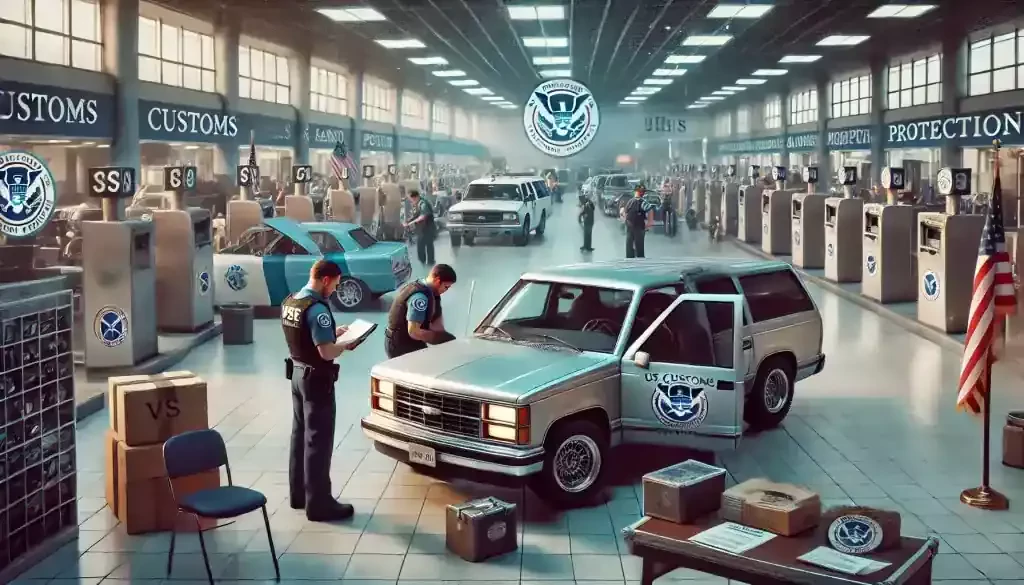Can I Import a Car from Mexico to the USA?
Published by Tamar Hela.

Have you ever wondered if importing a car from Mexico to the United States is possible? It’s possible, however, that international shipping regulations apply. Despite the proximity of the US to the area, seemingly separated only by a fence, there are still nuances to shipping a ride between the borders of the two countries.
It's not just about international transit but also about satisfying both the US and Mexico's standards. Shipping a car from the area to the US requires finding a common middle ground between Mexican sellers and US buyers.
In this article, we’ll guide you on how to import a car from Mexico. Learn what you must prepare to ensure a smooth import and car shipping process.

Importing A Vehicle From Mexico To The USA
The import process begins at the US Customs and Border Protection. This agency oversees the entry of all foreign vehicles into the US. The vehicle owner must prepare for customs clearance and meet federal emissions standards. Then, there are safety regulations to observe.
A set of necessary documentation is crucial for a successful import. These documents are:
- Bill of Lading
- Bill of Sale
- Proof of title or ownership
- Vehicle identification number (VIN)
- Personal ID of the shipper
- The vehicle's intended destination in the US
- EPA Form 3520-1 for emission requirements
- DOT Form HS-7
- Vehicle manufacturer's letter stating the vehicle's compliance with the US safety and emissions standards
If the car doesn't conform to US standards, a DOT-registered importer (RI) may need to modify the vehicle. After all documents are provided and cleared, an import duty will apply.
Customs Duties And Taxes
Vehicle owners must be prepared to pay import duty when bringing a car from Mexico to the US.
The current rates haven’t changed much in the past few years. The rates are as follows:
- 2.5% for vehicle
- 25% for trucks
- 2.4% for motorcycles
Duty rates can still change, so you should check the latest information with US CBP.
Besides import duties, taxes and other fees may be levied. For example, customs clearance fees and sales tax may apply in specific locations, depending on where the car comes into the US.
Your ride may get taxed if your vehicle doesn't meet US fuel economy standards. It's called the "gas guzzler tax." It applies to specific passenger cars, but not to trucks or SUVs. You can find a list of rides that this tax will impose on the EPA website.
For a smooth import process, have all the necessary payment forms ready. You may get fined if you fail to comply with these duties or taxes. Or worse, it can get your vehicle seized.
Exemptions From Delivery Duties And Taxes
On the other hand, exemptions or reductions in import duty might apply under certain circumstances. For example, if an American-made car went to Mexico and then returned, it may be exempt from duty.
Other exemptions from duties and taxes may also apply to the following:
- US military personnel or government workers returning to the US after an extended stay won't need to pay duties for their vehicles. However, the rules are that the car must be purchased internationally, and the owner must have it before returning to the US.
- Non-US residents can bring a vehicle with them without paying duties when entering the country. The car also doesn't need to conform to US standards immediately. However, it will be exported outside the US after one year if it isn't updated according to the applicable standards.
- Citizens who work out of the country can drive their motor vehicles duty-free in the US. But they must have a nonresident status. They must also bring the car with them when they leave.
Preparations For Hauling A Vehicle
Before proceeding with the import process, you have to make some preparations. Some of them are:
- Clear your cars from personal belongings. Your vehicle haulers or shipping company likely won't be responsible for theft, loss, or damage during transit. An auto shipping company may not accept your vehicle if it contains any personal items inside.
- Clean your vehicle thoroughly before shipping. The cleaning must include the car's undercarriage. The US Department of Agriculture requires no foreign soil to enter the US border. This is because dirt or soil on the ride may bring invasive pests or substances.
- Ensure your vehicle has 22.5 miles per gallon of combined fuel economy. The IRS may assess your vehicle for the gas guzzler tax if it is any shorter than that mark.
- Ensure exact conformation to US standards for safety and emissions. Otherwise, you may have to ship your vehicle using an independent commercial mover (ICI) or registered mover (RI) for modifications. The cost of their service can be very high.
- Avoid using moved vehicles for illegal activities. This goes without saying: don't use the cars for illicit activities. Transporting illegal narcotics or smuggling other substances can result in the car and the items being confiscated. Then, you may serve time in federal prison.
Engaging With Mexican Authorities
As part of the preparation for your vehicle import, you may have to deal with the Mexican government or authorities. The country may have its own export requirements, so check with local authorities in Mexico to ensure everything is legal.
For example, your vehicle may need to be deregistered in Mexico before legally moving to the US. You should also find out whether you must return your car's original Mexican documents or settle any taxes or fees.
Consult with the Mexican authorities or a customs agent to fully understand the required steps. Doing so can only help you process your import more smoothly.

The Shifting Cost Of Acquiring A Vehicle Internationally
The shipping cost of importing a car from Mexico is not cheap. It can go up to $2,000. However, you can still get a lower shipping rate based on several factors. So don't let the cost intimidate you. The following factors will apply:
- Distance: Naturally, distance matters. The farther your ride goes from the area to the final US destination, the more it will cost. For example, if the car is being shipped from Tijuana, Mexico, to Los Angeles, it will be less expensive than shipping the ride from the exact origin to Boston or New York.
- Speed: If you want the vehicle to arrive quickly from the area, you can use expedited shipping. A good shipping company certainly can facilitate this shipping method, but the cost will, of course, be much higher.
- Shipping method: Cars are commonly shipped from the area to the US by ground or by sea. Ground shipping is more affordable, especially if you want to save time and money. However, sea shipping can also be an option, although it will cost twice or five times more.
Shipping a vehicle from the area to the US is not recommended using sea shipment. The only times you may consider sea shipment for cars from Mexico to the US are as follows:
- Are you importing vehicles by bulk or have more than two cars to import
- The car is inoperable and can't handle long-distance towing
- You're hauling classic vehicles or vehicles of extremely high value and require extra security
Moving Implications For Vehicle Owners
Importing a car from Mexico carries various implications for vehicle owners. The first is to comply with US standards for safety, emissions, and bumper design. If the vehicle doesn't meet these standards, modifications may be required. This means additional costs.
Vehicle owners must also be responsible for keeping a comprehensive paper trail. It's not just vehicle registration and purchase contracts, but also any documents related to the import process. Doing this will substantiate your legal claim on the vehicle.
If you plan on reselling the moved vehicle, you must be aware that any alterations made will affect its resale value. The lack of a US certification label will also influence it, along with its marketability.
Vehicle owners must also reckon with ongoing compliance. You must keep up with periodic testing and certification required to maintain the vehicle's road legality in the US. Without these certifications, you may get a penalty and the car gets impounded.

Conclusion
As you’ve learned in this post, you can undoubtedly import a car from Mexico to the US. All you need to do is to ensure the vehicle meets US safety, emissions, and fuel standards. Prepare all necessary documents and the cars before you start the import process. You may want to contact a customs agent to ensure your moving process goes smoothly.
A1 Auto Transport will help you move your ride from Mexico to the US. In fact, A1 Auto Transport has expertise in international car shipping for when you want to import a car from anywhere in the world to the US. Get a free quote today, and let us handle all your ride shipping needs.






 Share on Facebook
Share on Facebook Share on LinkedIn
Share on LinkedIn Share on Twitter
Share on Twitter




 Google
Google  Instagram
Instagram 



